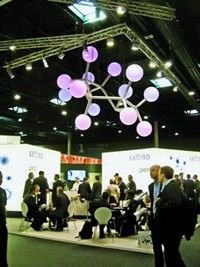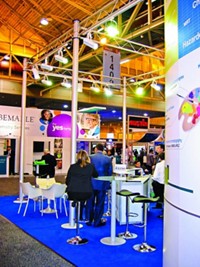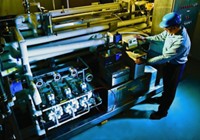Advertisement
Grab your lab coat. Let's get started
Welcome!
Welcome!
Create an account below to get 6 C&EN articles per month, receive newsletters and more - all free.
It seems this is your first time logging in online. Please enter the following information to continue.
As an ACS member you automatically get access to this site. All we need is few more details to create your reading experience.
Not you? Sign in with a different account.
Not you? Sign in with a different account.
ERROR 1
ERROR 1
ERROR 2
ERROR 2
ERROR 2
ERROR 2
ERROR 2
Password and Confirm password must match.
If you have an ACS member number, please enter it here so we can link this account to your membership. (optional)
ERROR 2
ACS values your privacy. By submitting your information, you are gaining access to C&EN and subscribing to our weekly newsletter. We use the information you provide to make your reading experience better, and we will never sell your data to third party members.
Business
Pharma Chemical Rebound Is Apparent At CPhI Meeting
CPhI attendees find strength in pharmaceuticals and promise in other fine chemicals markets
by Rick Mullin
October 29, 2012
| A version of this story appeared in
Volume 90, Issue 44

Fine chemicals and active pharmaceutical ingredients (APIs) executives attending the CPhI Worldwide exhibition in Madrid earlier this month said business has turned the corner following a downturn that coincided with the financial collapse of 2008. The uptick that began in 2010 at some companies, and last year at others, has carried through 2012, and most managers are looking to continued growth next year.
But in an industry heavily influenced by the vagaries of science and the fortunes of customers’ drug development pipelines, it is not surprising that stories of the rebound varied. Many executives claimed that pharmaceutical business is strengthening as drug companies increase outsourcing and bring it back from Asia to Europe and the U.S. Several companies said they are pushing to grow their nonpharmaceutical fine chemicals businesses. Others acknowledged they are still waiting for a sustained increase in business.
According to a survey released by UBM, the organizer of CPhI, 94% of exhibitors and 89% of visitors to the show rated their business opportunity in pharmaceuticals positively. Nearly 85% of visitors expect sales to increase over the next 12 months, whereas 65% said that was the case about the previous 12 months. About 60% said the current economic climate will have no impact or a positive impact on their business.
UBM counted 29,000 visitors from 133 countries and 2,200 exhibitors from 63 countries, including 236 new exhibitors at this year’s CPhI.
“It is no longer, ‘Recovery expected,’ ” said David Simonnet, chief executive officer of Axyntis, a French API supplier. “It is, ‘We are recovered.’ ” Revenues at the firm increased 30% in 2011 to $85 million. The company expects a 10% sales gain this year, Simonnet said, and a 20% increase in 2013 based on recently signed contracts. Factors fueling growth, he said, include a narrowing pricing gap with Asia as operating costs in India and China rise, a steady reduction in overcapacity in the sector, and a ramp-up in outsourcing.
Axyntis is boosting its business with pharmaceutical customers in Japan and the U.S., Simonnet said, and increasing emphasis on nonpharmaceutical fine chemicals markets, including agriculture, cosmetics, animal health, photography, and specialty polymers.
“Seventy-five percent of our capacity, which is maximum operating capacity, has been used since September,” Simonnet said, and the company is on the lookout for a small acquisition to increase capacity. Axyntis is also looking to ratchet up its service offering by making use of its pilot lab in partnership with customers. “We are looking to coinvest with customers and share part of the risk,” he said. The firm is studying two such opportunities in Europe and Japan.
Denis Geffroy, vice president of business development at Northern Ireland’s Almac, said the company is in the third year of a push to shift its manufacture of APIs for drugs toward projects in late-stage development. Almac currently has four projects in Phase III clinical development or commercial production, and 30% of its business is with customers with APIs in late-stage development.
Almac is expanding capacity at its headquarters site in Craigavon, installing two 1,000-L reactors and a 600-L pressure filter dryer, which will allow the company to scale up batch production from 10–50 kg to 100–150 kg. The company is spending approximately $3 million on the project. Geffroy said Almac’s chemistry business grew 15% last year.
At CPhI, Almac announced a biocatalyst partnership with DSM Pharmaceutical Products. Under the deal, the two companies get access to each other’s enzyme technology and research. The partnership, Geffroy said, combines Almac’s expertise in enzyme identification and scale-up with DSM’s multiton manufacturing capability.
Fabbrica Italiana Sintetici (FIS), an Italian API maker, has had an “amazing” year in 2012, according to Laura Coppi, sales and marketing director at the family-owned company. Sales may reach $390 million this year, Coppi said, up from $295 million in 2011. “We had an exceptional year based on work on a specific product,” she said, asserting that FIS did not experience a slump in 2009 and 2010.
Coppi joined FIS earlier this year at about the time the company acquired Delmar Chemicals, a Montreal-based pharmaceutical chemicals firm that specializes in process optimization and small-scale synthesis. The Delmar facility, FIS’s first in North America, complements kilogram-scale and larger production in Vicenza, Italy. More recently, FIS’s owners invested in Areta International, an Italian biologics manufacturer.
Purification specialist Novasep announced at CPhI that it will build its largest chromatography facility in Mourenx, France. The $39 million project will use the firm’s Varicol simulated moving bed technology to support a new contract to supply a large-volume purified API, according to Jean Bléhaut, director of marketing and business development at Novasep.
The project at Mourenx and the expansion of capacity in Le Mans, France, for high-potency APIs, including toxins for antibody-drug conjugates, are indicators of Novasep’s growth expectations, Bléhaut said. And some of that growth is expected in nonpharmaceutical areas, including agriculture, electronic chemicals, and cosmetics.
Bléhaut expects the company to achieve sales of close to $400 million this year. Although revenues for Novasep Synthesis, the firm’s small-molecule division, have been flat over the past two years, Novasep Process, the firm’s biomaterials division, has expanded by 50% over that period. Bléhaut said the company expects several of its late-stage development projects to go into commercial production next year.

Specialized chemistry is the route to renewed growth at Carbogen Amcis, according to CEO Mark C. Griffiths. Based in Switzerland, Carbogen is owned by India’s Dishman Group. Having seen the business reach the breakeven point over the past year, Griffiths is now looking at more aggressive financial targets for the future.
Meeting those targets will involve further growth in commercial production capabilities. In June, Carbogen announced that two sites in Switzerland, which previously focused on process R&D and early drug development, won Swiss authorization to produce drug substances at the commercial scale.
In September, Carbogen joined with the U.K.’s ADC Biotechnology to provide development and manufacturing services for antibody-drug conjugates. And having acquired Creapharm Parenterals early this year, Carbogen offers finished-dose drug formulation services. Creapharm specializes in liquid, semisolid, and injectable aseptic dosage forms, and Griffiths anticipates investing to add solid dosage forms.
Switzerland’s Siegfried is another company placing bets on finished-dosage services. Earlier this year, Siegfried acquired Alliance Medical Products, an Irvine, Calif.-based formulator of sterile liquid, suspension, emulsion, and ointment pharmaceuticals, for $58 million. Siegfried already runs a tableting operation in Malta.
CEO Rudolf Hanko says he anticipates rapid growth in the treatment of localized diseases—such as asthma and early-stage cancers that require inhalers and intravenous dosing—as a key incentive to bundle API production with the kind of formulation services the firm will now offer in California.
The fine chemicals divisions of major chemical companies at CPhI were also showing strength. Scott Thomson, senior vice president of BASF’s pharmaceutical ingredients unit, said business is doing well. “Pharmaceuticals are rather resistant to cyclical change,” he pointed out, in contrast to some other industries in which BASF operates. As a result, “we are a growth business for BASF and will continue to expand in the future.”
BASF’s pharmaceutical ingredients unit, which focuses on contract manufacturing and the production of excipients and generic APIs, is moving its headquarters from Evionnaz, Switzerland, to Florham Park, N.J. “North America is the decision-making hub of the pharmaceutical industry,” Thomson said, “and we want to get closer to our customers.”
Saltigo, part of Lanxess, is holding up following a merger of its pharmaceuticals and fine and agricultural chemicals units into one organization, said CEO Wolfgang Schmitz. “Business, in general, is doing well. We have a good agro business and a stable pharma business.”
Given the merger of Saltigo’s marketing activities, outside observers have speculated that the firm will be placing greater emphasis on its nonpharmaceuticals businesses going forward. Indeed, the company is halting operations at its Redmond, Wash., facility, which it acquired in 2008 from the drug company Icos. That move, however, is in keeping with the company’s shift of focus to manufacturing APIs for projects in Phase III clinical development, according to Saltigo.
Schmitz downplays the effect of Saltigo’s reorganization on its operations and dismisses the notion that the firm is deemphasizing pharmaceuticals. “We have a slightly different organizational framework,” he said, but business in process development, service, and manufacturing is progressing as it did under the previous structure.
The firm is “looking for special types of products utilizing our asset base—projects utilizing five to seven value-adding steps,” Schmitz said.
Although pharmaceutical business is still important, Saltigo is also interested in building its presence in other markets, Schmitz pointed out. In agricultural chemicals, which represent fully half of the firm’s sales, he said Saltigo is having a strong 2012, and he anticipates the trend will continue into 2013.
At Albemarle, the fine chemistry services business accounts for about $300 million in annual sales. Although tough economic conditions have dampened the rest of the company, fine chemistry is doing well, according to David W. DeCuir, director of the business. “The future looks very positive.”
In the past four years, the custom manufacturing half of the business has grown more than 25% annually, DeCuir said. Much of the growth has come from “casting a wide net,” he added. “We don’t just make APIs or agricultural intermediates and actives, but we look for a variety of other specialty chemical markets.” The company has just approved a second expansion of its Tyrone, Pa., facility, a plant with flexible production capability that serves markets outside the pharmaceutical area.
Some of the venture-capital-owned firms that exhibited at CPhI are going through reorganizations that have affected sales growth. Two years after it was acquired from France’s SNPE by the German venture capital group Aurelius, Isochem is less sanguine about revenue growth than other firms at the show, but it sees benefits to operating independently of a large conglomerate. “2012 will be okay,” said Xavier Jeanjean, commercial director. “We have a challenging budget, but we will make it.”
Expected sales of about $142 million this year will represent “slight growth,” Jeanjean said. Sales in agricultural chemicals were down in 2012, and pharmaceuticals and other fine chemicals markets improved modestly. Jeanjean is not optimistic about next year. “We are not expecting a turnover increase. Maybe a slight decline,” he said. “But it is not a big problem. We are in a good cash position with no debt. Money in the bank is very rare.”
Chemie Uetikon, another venture-capital-owned API producer, has seen a rebound in recent months. “We had a tough time in the crisis years 2009 and 2010,” said CEO Heinz Sieger. “But we recovered well in 2011, and we’re holding on in 2012.” Sales last year grew 30%, Sieger said, the year the firm was acquired by Equistone Partners Europe.
Most of the company’s new custom synthesis work is on projects that are in early-stage development and rely heavily on R&D services, Sieger said. “People can come to us with a drawing of a molecule or have a full laboratory development plan,” he said. “In either case we put a lot of work into it.” About half of the firm’s revenues derive from custom synthesis and the rest from generics.
Equistone bought Chemie Uetikon because it was profitable, Sieger said, and Equistone is working on a deal to acquire another fine chemicals company and merge the two. “Their strategy is that they only buy pearls,” Sieger quipped, attributing Chemie Uetikon’s growth in 2011 to investment in its workforce and plant in Lahr, Germany, prior to the recent financial crisis in Europe.
Indeed, financial crisis has haunted CPhI for four years, and it surfaced in discussions in Madrid. But CPhI attendees were more optimistic this year regarding a near-term return to stability. Sieger, for example, pointed to the European Stability Mechanism, an effort launched by the European Union last month to provide financial assistance, where necessary, to countries in the eurozone. “We may go back to a normal situation in about two years,” he said.—Additional reporting by Ann Thayer and Maureen Rouhi







Join the conversation
Contact the reporter
Submit a Letter to the Editor for publication
Engage with us on Twitter